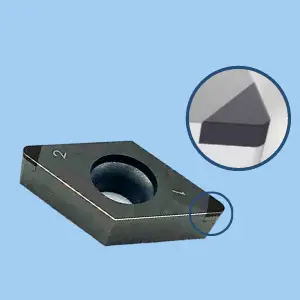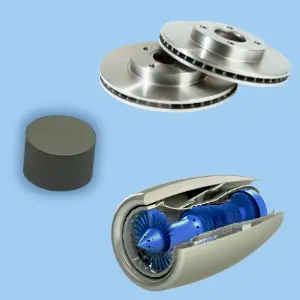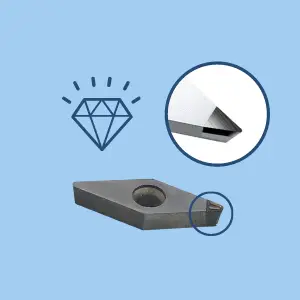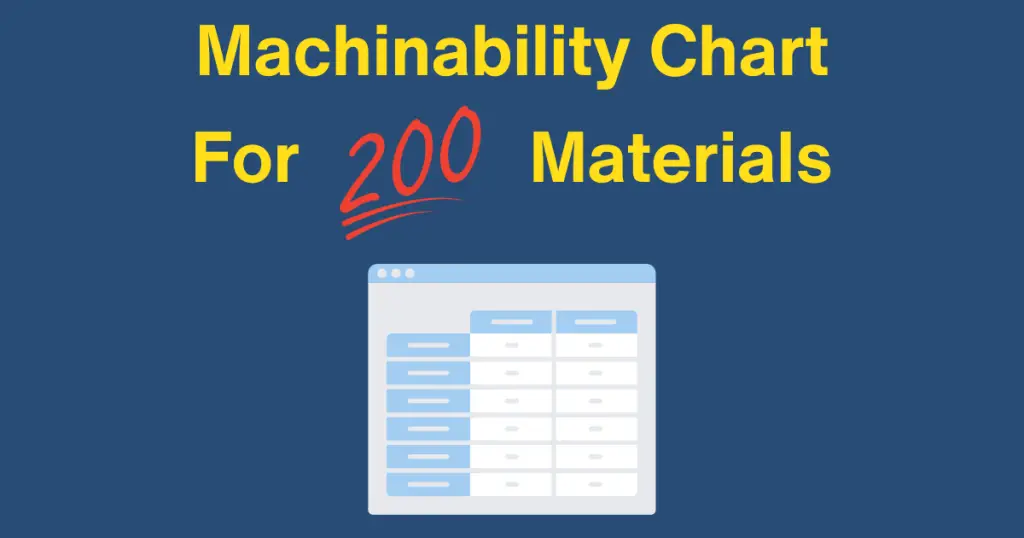What are advanced cutting materials?
Advanced Cutting Materials in machining refers to CBN, PCD, and Ceramic-based inserts. The common property between them is that they are harder than carbide grades, and therefore provide unique solutions to machine exotic materials and hardened steel.


What are the main uses of Advanced Cutting materials?
- Machining Hard steel between 45 HRC up to 70 HRC. (Ceramic and CBN)
- Machine Cast Iron 3 times faster compared with coated carbide inserts. (Ceramic and CBN)
- Machine Inconel (HRSA) 5 times faster compared with coated carbide (Ceramic and CBN)
- Machine Aluminium and other non-ferrous materials up to 8 times faster compared with carbide inserts. (PCD)
Advanced Cutting materials Comparison Table
| PROPERTY | CARBIDE | CERAMIC | CBN | PCD |
|---|---|---|---|---|
| Hardness [HV] | 1,300-1,800 | 2,100-2,400 | 4,500-5,000 | 5,000-6,000 |
| Price per Cutting Edge [USD] | 4$ | 10$ | 40$ | 160$ |
| Machining Hard Steel |
|
|
|
N/A |
| Machining Cast Iron |
|
|
|
N/A |
| Machining Super Alloys |
|
|
|
N/A |
| Machining Aluminum |
|
N/A | N/A |
|
CBN

PCBN (Nicknamed CBN) stands for “Polycrystalline Cubic Boron Nitride”, the second hardest material, second only to diamond. In addition to its high hardness (4,500 HV), it also has excellent hot hardness and chemical stability. Therefore, it can successfully machine Steel up to 70 HRC and other hard-to-machine materials.
Main uses of CBN Inserts:
- Machine Steel heat treated to 50-70 HRC. (Coated carbide inserts cannot machine materials above 45 HRC)
- Machine Cast Iron 3 times faster compared with coated carbide inserts. (~ 1,500 mm/min, 5,00 SFM)
- Machine Titanium and Inconel (HRSA) 5 times faster compared with coated carbide (~350 mm/min, 1,100 SFM)
Ceramics

Ceramic Inserts are indexable inserts made from Aluminium Oxide Al2O3 or Silicon Nitride Si3N4. They have a hardness of 2,100-2,500 HV (About 40% above carbide), which enables them to machine Hard Steel up to 55 HRC. It can also machine cast iron and nickel-based alloys six times faster compared to coated carbide inserts.
Main uses of Ceramic Inserts
- Machine Steel heat treated up to 55 HRC. (Coated carbide inserts cannot machine materials above 45 HRC).
- Machine Cast Iron 6 times faster compared with coated carbide inserts. (~ 2,000 mm/min, 6,50 SFM)
- Machine Nickel-based superalloys seven times faster compared with coated carbide (400 mm/min, 1,300 SFM)
PCD

PCD stands for “Poly Crystalline Diamond”, the hardest available cutting material. PCD is a synthetic diamond produced by sintering together selected diamond particles with a metal matrix at high temperature and high pressure. The result is 90-95% diamond content material that reaches a hardness close to 6000 HV. In addition, the small amount of the binder gives the material additional toughness that makes it an efficient cutting material.
Although PCD has higher toughness than natural diamond, it still extremely brittle compared with other cutting materials. Because of that, PCD is used only to machine soft Non-Ferrous materials. The most popular material machined with PCD is Aluminum, followed by plastics and brass.









